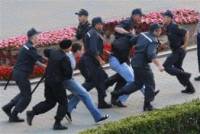Belarusian Police and KGB detain Revolution via social network activists and journalists

Online, they call for changes in their authoritarian nation of Belarus. Offline, in front of riot police and sympathetic passers-by, they simply clap their hands and stomp their feet.
For a third Wednesday in a row, thousands of young social media activists chose the offline approach by holding banned rallies in cities and towns across their ex-Soviet country.
Two previous rallies have been banned and dispersed, and many activists were interrogated ahead of the third one held in Minsk, the capital, and other locations, said the respected human rights group Vyasna.
Agents of KGB, as Belarus’ security agency is still known, detained hundreds of others during the protests, even though the youths did not shout protest slogans or display any banners.
Belarus is undergoing a severe economic crisis, and longtime President Alexander Lukashenko has overseen a sweeping crackdown on opposition and government critics.
Authorities routinely block opposition websites using web-filters similar to those used in China.
Pro-democracy activists such as those protesting Wednesday routinely use Facebook, Twitter and other social networking websites to support one another and their cause.
Sergei Pavliukevich, an activist whose postings have been followed by hundreds of thousands of Internet users, said he was briefly arrested by KGB agents Monday and released only after disclosing his passwords to social media websites.
He said police removed his postings calling for protests against Lukashenko’s policies, but he remains optimistic about the success such demonstrations can have, both online and offline.
"With the Internet, even these dictatorial authorities have a hard time shutting our mouths, " Pavliukevich said in a telephone interview.
The government had warned that Wednesday’s rallies were banned. Police also cordoned off streets in Minsk and shut down public transportation.
But hundreds of youngsters gathered in small groups in the center of the city, some arriving on bicycles.
"I’m tired of fear, " said Anton Volodkevich, a 19-year-old student with dreadlocks. "Even in a closed society one has to find a way to protest. We do it by clapping and stomping."
Minutes later, riot police started forcing him and others out of the street or throwing them into police vans.
Independent online media and bloggers in Belarus said that Wednesday’s silent rallies took place in about 30 cities and towns across the nation of 10 million people.
For most of his 17 years in power, Lukashenko has relied on Russia — Belarus’ main sponsor and ally — to maintain a quasi-Soviet economy complete with a social safety net that helped maintain his popularity.
But the Russian subsidies have dwindled recently as Moscow pushes for control over Belarus assets such as oil refineries and chemical plants in exchange for more loans.
Many people have compared the crisis in Belarus with the economic shock that followed the 1991 Soviet collapse.





